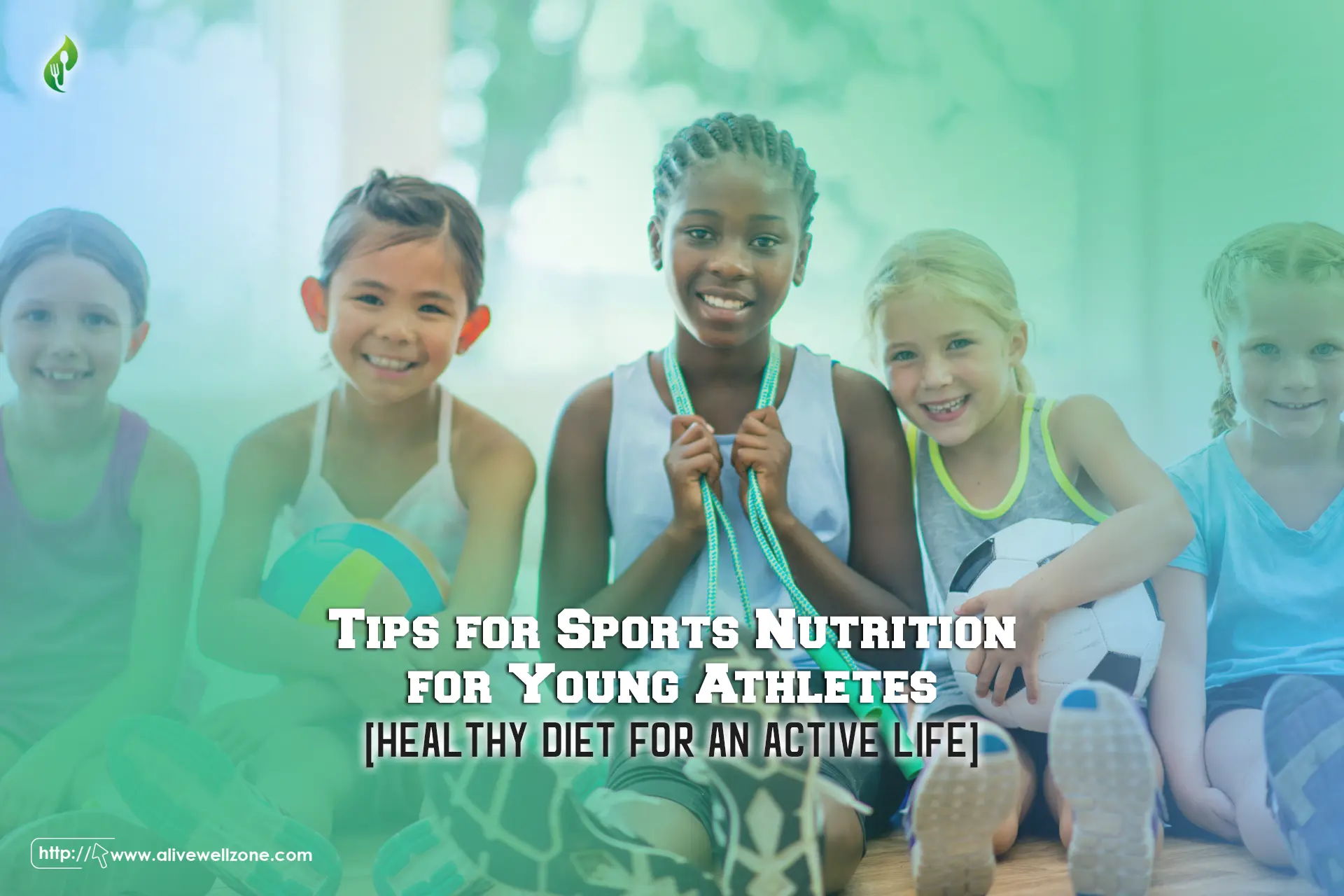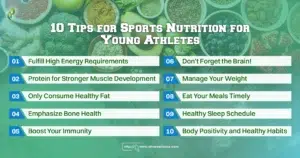
Last Updated on November 19, 2024 by Helena Akter
Sports nutrition for young athletes is different from the diet of adult sportsmen. Young athletes have high energy, stamina, and determination. However, they also require more nutrition and care.
Now, sports nutrition doesn’t only mean “eating healthy”.
You have to understand the unique needs of young athletes and prioritize accordingly. Focus on bone health, immunity boosting, weight management, and post-workout recovery.
Include more carbohydrates, protein, vitamins, and minerals for a healthier diet!
Sports nutrition also means staying hydrated and getting enough sleep. Know more about the dos and don’ts of sports nutrition for young athletes!
Why is Sports Nutrition Unique for Young Athletes?
Sports nutrition is particularly important for young athletes because their bodies and brains are still in development.
Unlike adults, these young athletes need extra attention to ensure they are getting proper nutrition to support both their athletic performance and their growth.
Young athletes are growing and developing, which means they need adequate nutrition not just for their sports activities but also for their overall bone and muscle development.
The human brain continues to develop until around the age of 25. So, young athletes need to receive sufficient nutrients to support healthy brain development as well.

Moreover, young athletes tend to burn a lot of calories due to their high levels of activity. It’s important to include plenty of healthy fats, carbohydrates, and proteins in their diet to meet these increased energy demands.
Making sure they receive timely meals and proper hydration is also key to maintaining their overall health and optimizing their athletic performance.
What Should Young Athletes Have Before and After Training or Practice?
Before moving on to the nutrition tips, you need to know what to have before and after training as a young athlete.
Before Training
Your body requires a well-rounded meal or high-calorie snack 2-3 hours before practice or training to digest everything properly. If you have early morning practice, try eating at least 2 hours ahead.
Young athletes often have after-school practice. So remember to carry a little healthy snack to eat 30-60 minutes before for an extra kick.
If you have a long journey to and from practice, make sure you plan ahead!
Here are some healthy snack ideas for your next practice:
- Oatmeal with berries and a sprinkle of nuts
- Yogurt with granola and fruit
- A bagel with lean protein like turkey breast
Remember to drink enough water before practice and stay hydrated during the session. Don’t overeat as it may hinder your practice and make you uncomfortable!
After Training
Once you’re done training, it’s time to give your body some nutrition back. Go for a recovery meal or snack within 30-60 minutes after exercise.
Here are some examples of healthy post-workout meals:
- Whole-wheat pasta with grilled chicken and vegetables
- Smoothie with banana, spinach, and protein powder
- Turkey sandwich on whole-wheat bread with fruit
10 Tips for Sports Nutrition for Young Athletes

Young athletes are the future of the sports industry. To make sure they reach their growth potential, follow these 10 easy sports nutrition tips —
1. Fulfill High Energy Requirements
Young athletes spend a lot of energy on training, games, and growth spurts. You also need carbohydrates to maintain blood glucose and refill muscle glycogen.
The ideal percentage of the diet is between 45%-65% carbohydrate. However, young athletes start with at least 50% of their diet due to recommendations.
To get to that percentage, you can eat —
- Breakfast: Whole wheat toast or oatmeal with rolled oats.
- Lunch: Brown rice or quinoa with fish, grilled chicken, and topped with roasted vegetables.
- Dinner: Lean protein, whole grain such as pasta, and salad full of all colors of vegetables.
- Snacks: Fruits like bananas or apples with a handful of almonds or whole-wheat crackers with cheese.
2. Protein for Stronger Muscle Development
Since young athletes are highly active, it can put too much stress on their muscles and create microtears. Protein works as the building block of muscles.
Besides, during this age, youngsters go through hormonal changes. You also need protein to produce essential enzymes and hormones.
Youth athletes usually require about 1.5 g/kg of daily protein consumption. But make sure that you don’t consume too much protein as it can result in extra urea. It increases the risk of dehydration and may cause calcium loss.

Looking for healthy protein snacks and meals?
- Post-Workout Snack: Get a small protein-rich snack within 30 minutes after exercise. You can have Greek yogurt with berries, a protein shake made with milk and fruit, or hard-boiled eggs.
- Include Protein at Every Meal: Choose lean protein sources like chicken, fish, beans, lentils, or tofu throughout the day.
3. Only Consume Healthy Fat
Fat is a must for producing energy and protecting your organs. Besides, healthy fats like omega-3s support brain development and cognitive function.
Your fat intake should be 20-25% of the total calorie consumption. Make sure that it’s not less than 15% and doesn’t go over 30%.
Remember, unsaturated fat is always better than saturated!
- Monounsaturated Fats: These are found in olive oil, avocados, nuts, and seeds. Drizzle a little olive oil in your salad or add avocado slices to your toast!
- Polyunsaturated Fats: Include omega-3 and omega-6 fatty acids. Sources include fatty fish, walnuts, and soybean oil. Avoid sugary spreads and try healthy nut butter instead!
4. Emphasize Bone Health
Proper sports nutrition for young athletes nutrition is important to develop strong bones and healthy tissues. While protein helps maintain healthy ligaments and tendons, you also need calcium and vitamin D for strong bones.
Since young athletes are still growing, it’s important to focus on these essential nutrients. Strong bones can help reduce the risk and severity of injuries.
- Calcium in Food: Make sure to include dairy products like milk, yogurt, and cheese in their diet. You can also get calcium from green leafy vegetables such as kale and broccoli.
- Vitamin D: To increase vitamin D intake, include sardines, fatty fish, mushrooms, and liver in their diet. Also, encourage spending time outdoors in the sun, as this promotes vitamin D production, benefiting bone health.
5. Boost Your Immunity
As young athletes train and play a lot, they’re also more likely to fall sick due to physical stress. You also need a strong immunity system to fight off infections and stay healthy during sports seasons.
Make sure your diet is rich in vitamins, minerals, and antioxidants. These micronutrients play a key role in strengthening your immune system.
- Tons of Fruits and Vegetables: Include a variety of colourful fruits and vegetables in the diet. These are rich in vitamins, minerals, and antioxidants that support immune function. Make a healthy salad using broccoli, beetroot, spinach, carrot, and your favorite dressing!
- Multivitamin Supplements: If you don’t have access to fresh fruits and vegetables, get supplements to fill the nutrition gap. Always consult with a nutritionist first!
6. Don’t Forget the Brain!
Don’t overlook the importance of brain health, especially for young athletes. A sharp brain can improve focus and enhance overall performance. Since their brains are still developing, it’s important to include brain-boosting foods in their diets.
Incorporate leafy greens like spinach, kale, broccoli, and collards, which are rich in nutrients such as vitamin K, lutein, folate, and beta-carotene. These elements help enhance brain function.
Additionally, fatty fish, berries, and nuts are excellent for supporting brain development.
7. Manage Your Weight
Maintaining a healthy weight is important for young athletes.
Include complex carbohydrates, lean protein, low-fat or fat-free dairy, and healthy fats in your diet for balanced nutrition. Remember to always read food labels and determine the portions first.
Avoid processed food as it often contains unhealthy fats, added sugar, and sodium. Go for more home-cooked meals or snacks. Don’t give in to cravings or unhealthy treats! You can lose weight, gain muscles, and improve flexibility with some simple workouts.
Instead of unhealthy foods, try healthier alternatives. Fried food contains a lot of calories so consider baked and air-fried dishes.
8. Eat Your Meals Timely
As surprising as it sounds, eating your meals regularly can help athletes to manage their weight and stay healthy. Try to have your daily meals (breakfast, lunch, and dinner) around the same time every day. You can have healthy snacks in between meals.
Avoid skipping meals as it can promote hunger and induce overeating. Pay attention to your appetite and fullness so that you don’t eat too much.
9. Healthy Sleep Schedule
Adequate core sleep is important for both physical and mental recovery. Sports is a tiring activity and young athletes need a healthy sleep schedule to regain their energy. A balanced meal consisting of complex carbohydrates and lean protein can help you sleep better.
However, always avoid caffeine or sugary drinks before going to bed!
- Pre-bedtime Snack: Get a light, protein-rich snack like a small bowl of whole-wheat cereal with milk or a few slices of turkey with cheese.
- Limit Certain Food: Don’t consume spicy or acidic food a few hours before bedtime. These may cause heartburn or discomfort. As a treat, you can have a glass of tart cherry juice! This contains melatonin which is a natural sleep-inducing hormone.
10. Body Positivity and Healthy Habits
Media often portrays unrealistic body types. As a young athlete, it’s important to focus on good health, not attractive appearance. Never go on unrealistic diets to lose weight fast! Instead, practice healthy habits for a positive lifestyle.
Remember, the journey of an athlete is never easy, and good health takes time. Eat nutritious food that keeps you full for longer, sleep timely, and stay hydrated!
Sports nutrition is more than just food, it’s about fostering a healthy relationship with food and the body. You can consult professional dieticians for better insight!
The Bottom Line
To be a good athlete, you need to have excellent strength, stamina, and health. The perfect balance of healthy habits and nutritious food can help you become a successful athlete.
However, sports nutrition for young athletes should be well-planned, balanced, and personalized. As these athletes have room for physical growth and development, nutrition can’t be compromised at any cost.
Focus on bone health, immune system, and brain development. Make a habit of sleeping an adequate amount regularly and keep a positive mind!











